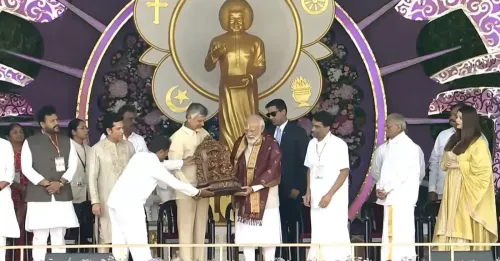How Does Indira Gandhi Inspire Rahul Gandhi to Stand Against Injustice?

Synopsis
Key Takeaways
- Indira Gandhi's legacy continues to inspire contemporary leaders.
- National Integration Day commemorates her contributions to India's unity.
- Rahul Gandhi emphasizes the importance of courage in confronting injustice.
- Her leadership during crucial historical moments, like the 1971 war, stands out.
- The tribute highlights the relevance of her values in today's political climate.
New Delhi, Nov 19 (NationPress) Rahul Gandhi, the Leader of Opposition in the Lok Sabha, paid tribute to his grandmother, former Prime Minister Indira Gandhi, on her birth anniversary and expressed that her unwavering patriotism and ethical values instill in him the fortitude to "stand against injustice". In a post on X, he stated, "My grandmother is my source of inspiration, guiding me to make bold decisions for India while always prioritizing the nation's welfare. Her courage, patriotism, and ethics empower me to stand firmly against injustice even today."
Earlier that day, the Congress party commemorated Indira Gandhi at Shakti Sthal in New Delhi. Rahul Gandhi, accompanied by Congress Chairperson Sonia Gandhi, National President Mallikarjun Kharge, General Secretary K.C. Venugopal, and other party leaders, arrived to offer floral tributes to the former Prime Minister.
Congress chief Kharge also shared on X, "The exemplary and dynamic leadership of Smt. Indira Gandhi, marked by immense political courage, will always inspire us. Her unwavering commitment and lifelong dedication to public service have left a permanent mark on India's progress."
"Her ultimate sacrifice in defending the nation's unity and integrity deserves countless accolades," he added.
Indira Gandhi, known as the 'Iron Lady of India', was born on November 19, 1917, in Allahabad, Uttar Pradesh, into a Kashmiri Pandit family. She was the daughter of India's first Prime Minister, Jawaharlal Nehru, and Kamala Nehru.
National Integration Day, celebrated every year on November 19, aligns with her birth anniversary, honoring her crucial role in shaping India's political, social, and economic landscape.
As India advances toward global prominence, National Integration Day serves as a reminder of Gandhi's contributions to national unity. The observance was initiated by the Indian National Congress in 1985 to celebrate her efforts in promoting unity.
This day holds profound significance, offering a chance to celebrate India's diversity and acknowledge the collective efforts necessary for national development.
During her tenure as Prime Minister from 1966 to 1977 and again from 1980 until her tragic assassination in 1984, Gandhi tirelessly worked to enhance national integration. Her political career was characterized by an unwavering commitment to unity and integrity.
Among her notable achievements was her decisive leadership during the 1971 India-Pakistan war, which led to the formation of Bangladesh. Her actions reinforced her image as a leader with a strong vision and resolve.
Throughout her political journey, she emphasized the significance of uniting individuals from diverse regions, cultures, and backgrounds under a common national identity. Her leadership and policies consistently aimed at fostering unity and advancing the nation's progress.









